-
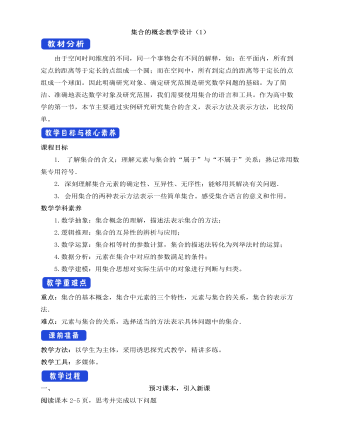
人教A版高中数学必修一集合的概念教学设计(2)
例7 用描述法表示抛物线y=x2+1上的点构成的集合.【答案】见解析 【解析】 抛物线y=x2+1上的点构成的集合可表示为:{(x,y)|y=x2+1}.变式1.[变条件,变设问]本题中点的集合若改为“{x|y=x2+1}”,则集合中的元素是什么?【答案】见解析 【解析】集合{x|y=x2+1}的代表元素是x,且x∈R,所以{x|y=x2+1}中的元素是全体实数.变式2.[变条件,变设问]本题中点的集合若改为“{y|y=x2+1}”,则集合中的元素是什么?【答案】见解析 【解析】集合{ y| y=x2+1}的代表元素是y,满足条件y=x2+1的y的取值范围是y≥1,所以{ y| y=x2+1}={ y| y≥1},所以集合中的元素是大于等于1的全体实数.解题技巧(认识集合含义的2个步骤)一看代表元素,是数集还是点集,二看元素满足什么条件即有什么公共特性。
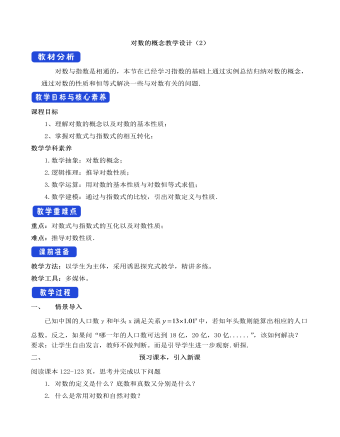
人教A版高中数学必修一对数的概念教学设计(2)
对数与指数是相通的,本节在已经学习指数的基础上通过实例总结归纳对数的概念,通过对数的性质和恒等式解决一些与对数有关的问题.课程目标1、理解对数的概念以及对数的基本性质;2、掌握对数式与指数式的相互转化;数学学科素养1.数学抽象:对数的概念;2.逻辑推理:推导对数性质;3.数学运算:用对数的基本性质与对数恒等式求值;4.数学建模:通过与指数式的比较,引出对数定义与性质.重点:对数式与指数式的互化以及对数性质;难点:推导对数性质.教学方法:以学生为主体,采用诱思探究式教学,精讲多练。教学工具:多媒体。一、 情景导入已知中国的人口数y和年头x满足关系 中,若知年头数则能算出相应的人口总数。反之,如果问“哪一年的人口数可达到18亿,20亿,30亿......”,该如何解决?要求:让学生自由发言,教师不做判断。而是引导学生进一步观察.研探.
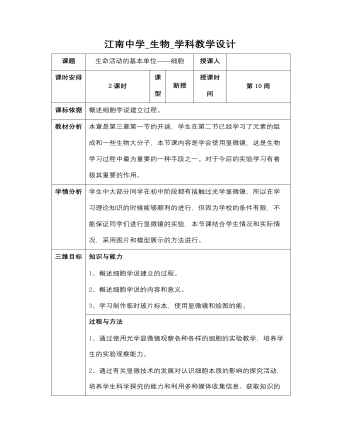
高中生物苏教版必修一《31生命活动及本单位-细胞》教案
本章是第三章第一节的开端,学生在第二节已经学习了元素的组成和一些生物大分子,本节课内容是学会使用显微镜,这是生物学习过程中最为重要的一种手段之一。对于今后的实验学习有着极其重要的作用。 学生中大部分同学在初中阶段都有接触过光学显微镜,所以在学习理论知识的时候能够顺利的进行,但因为学校的条件有限,不能保证同学们进行显微镜的实验,本节课结合学生情况和实际情况,采用图片和模型展示的方法进行。 知识与能力 1、概述细胞学说建立的过程。 2、概述细胞学说的内容和意义。 3、学习制作临时玻片标本,使用显微镜和绘图的能。
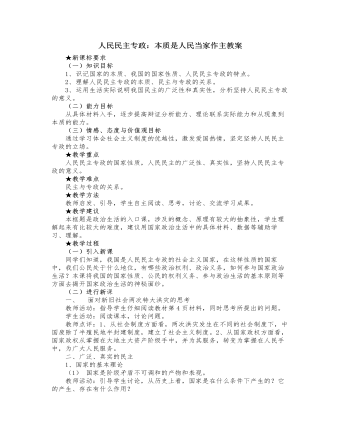
人教版高中政治必修2人民民主专政:本质是人民当家作主教案
三、坚持人民民主专政教师活动:请同学们阅读教材P7页,思考下列问题:为什么要坚持人民民主专政?现阶段如何坚持人民民主专政?学生活动:阅读课本,找出问题。1、坚持人民民主专政的重要性(1)坚持人民民主专政是四项基本原则之一,是我国的立国之本。(2)坚持人民民主专政是现代化建设的政治保证。坚持人民民主,才能调动人民现代化建设的积极性;坚持对敌对势力的专政,才能保障人民民主,维护国家安定。2、坚持人民民主专政的新的时代内容突出经济建设服务职能;为改革开放和现代化建设创造良好国内外环境;重视法制建设,依法治国;发展人民民主,加强民主制度建设。(三)课堂总结、点评本节内容讲述了我国的国家性质的有关知识,懂得我国是人民民主专政的社会主义国家,其本质是人民当家作主,我国的人民民主具有广泛性和真实性,是真正的大多数人的统治,必须坚持人民民主专政。
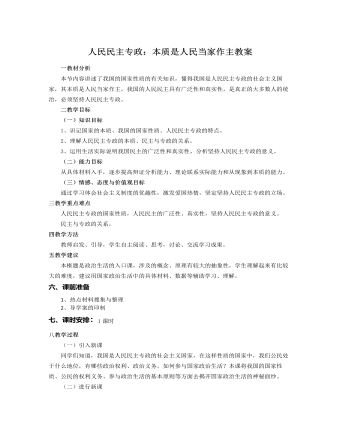
人教版高中政治必修2人民民主专政:本质是人民当家作主教案
4、民主和专政(1)民主,是指在范围内,按照和来共同管理国家事务的国家制度。民主具有鲜明的,民主总是属于。世界上从来没有的民主。(2)专政,即主要依靠实行的统治。(3)民主制国家是民主和专政的辩证统一(对立统一)①民主和专政相互区别、相互对立,民主只适用于,专政则适用于。②民主与专政是相辅相成、互为前提。民主是专政的,专政是民主的。(4)人民民主专政也是民主与专政的辩证统一。三、必须坚持人民民主专政(1)坚持人民民主专政的必然性(原因)第一、坚持人民民主专政是之一,四项基本原则是我国的,是我国国家生存发展的。第二、坚持人民民主专政是社会主义现代化建设的。①只有充分发扬社会主义民主,确保的地位,保证人民,尊重和保障,才能。②只有坚持国家的专政职能,打击,才能保障,维护。(2)坚持人民民主专政的新的要求:
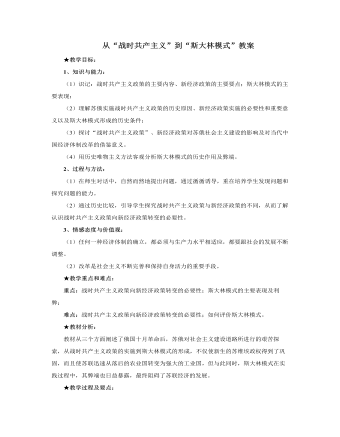
人教版高中历史必修2从“战时共产主义”到“斯大林模式”教案
5、弊端:(1)经济发展不均衡,片面发展重工业,使轻工业和农业长期处于落后状态;(2)对农民的剥夺太重,挫伤了农民的生产积极性;(3)长期执行指令性计划严重削弱了企业的生产自主权,不利于发挥企业的生产积极性,制约了苏联经济的可持续发展。(4)计划经济体制确立后,没有随着社会的变化进行调整,二战后逐渐僵化,丧失了自我完善的功能,成为苏联解体的重要因素。【合作探究】斯大林模式的评价及经验教训:积极:①使苏联迅速实现了 工业化②苏联经济实力的迅速增长,为反法西斯战争的胜利奠定了 物质基础 。消极:①政治:高度集权,破坏了 民主与法制 ; ②经济:优先发展重工业使 农业和轻工业长期处于落后状态,农民生产积极性不高;计划指令,压制了地方和企业的积极性,阻碍苏联经济的发展高度集中的计划经济体制,成为东欧剧变和苏联解体的重要原因。
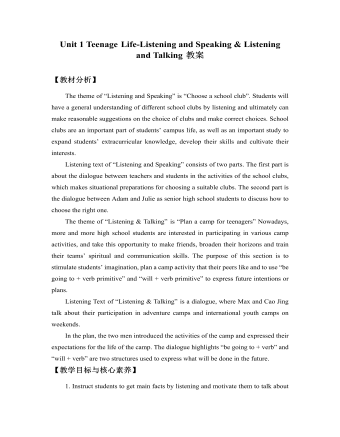
新人教版高中英语必修1Unit 1 Teenage Life-Listening and Speaking & Listening and Talking教案
Step 2 Listening and Talking1. The teacher is advised to talk with their new students about the related topic: Boys and girls, do you know some structures to talk about future activities? Talking about future activitiesWe’ll …I plan to …There’ll be …I hope to …We’re going to …2. After their small talk, the teacher can move on by playing the listening and solve the following task.Underline the expressions in the sentences below Cao Jing and Max use to talk about the future.We’ll learn useful skills.I plan to improve my spoken English.There’ll be students from different schools.I hope to make new friends.We’ll talk about teenage life.I’ll learn to make a fire.There’ll be students from different countries at the camp.There’ll be some experts there to show us how to live in the wild.We’re going to learn about wildlife.I’m going to give a speech.I think I’m going to enjoy the activities.I think we’ll have a lot of fun.3. Work in groups. Plan a youth camp.Teacher make the Ss think of ideas for the camp. And they can use the questions below to get started. And have the Ss present their ideas for a youth camp to the class.●What kind of camp is it?●Who will be there?●What will they do?●What will they learn?
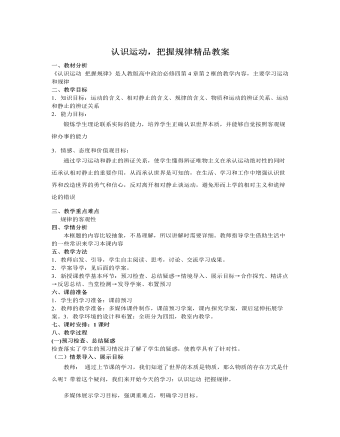
人教版高中政治必修4认识运动,把握规律精品教案
一、教材分析 《认识运动 把握规律》是人教版高中政治必修四第4章第2框的教学内容,主要学习运动和规律二、教学目标1.知识目标:运动的含义、相对静止的含义、规律的含义、物质和运动的辨证关系、运动和静止的辨证关系2.能力目标: 锻炼学生理论联系实际的能力,培养学生正确认识世界本质,并能够自觉按照客观规律办事的能力3.情感、态度和价值观目标:通过学习运动和静止的辨证关系,使学生懂得辨证唯物主义在承认运动绝对性的同时还承认相对静止的重要作用,从而承认世界是可知的,在生活、学习和工作中增强认识世界和改造世界的勇气和信心,反对离开相对静止谈运动,避免形而上学的相对主义和诡辩论的错误三、教学重点难点规律的客观性四、学情分析本框题的内容比较抽象,不易理解,所以讲解时需要详细。教师指导学生借助生活中的一些常识来学习本课内容
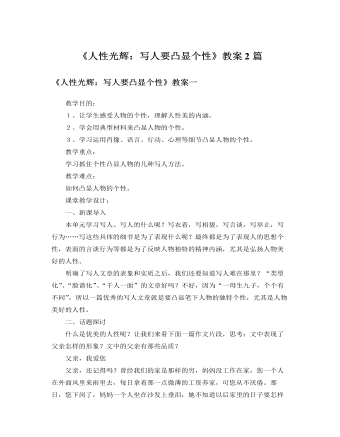
人教版高中语文必修1《人性光辉:写人要凸显个性》教案2篇
(学生展开畅叙所谈,言之有理即可。)归纳:以上因素在人物语言表达中是综合体现的,所以在写作时必须周密思考,使人物语言体现的人物性格更丰富,更有立体感。(3)行动描写矛盾先生曾说:“人物性格必须通过行动来表现。”我们在写作文时,应当注意描写最能揭示人物本身的独特性格的,最合乎人物地位,身份的动作,从而使人物形象更生动。行动描写要注意哪些方面?A、选择具有代表性,最能表现人物性格的行动来写。如《守财奴》中的老葛朗台的性格特点。B、要善于选择具有表现力的动词,把人物的行动准确传神地描写出来。(4)侧面描写写作不仅可以从正面对人物加以刻画,也可以通过周围各种不同人物的眼看,嘴讲等方式,从侧面起到烘托某个特定人物的作用。(请学生欣赏片段《茶花女》,《红楼梦》,教师归纳。)
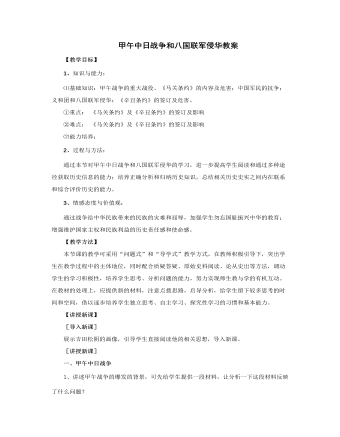
人教版高中历史必修1甲午中日战争和八国联军侵华教案
(1)巨额的赔款,是列强对中国空前的大规模勒索;为支付这笔巨额赔款,清政府加紧搜刮人民,使人民生活更加贫困,社会经济更加凋敝。(2)在北京设立的“使馆界”,实际上是“国中之国”,是帝国主义策划侵略中国的大本营。外国侵略者控制京津地区,使清政府完全处于外国军队的控制之下,便于侵略者直接派兵镇压中国人民的反帝斗争。(3)按照条约规定,清朝官吏严厉镇压中国人民的反帝斗争,进一步成为帝国主义的帮凶。(4)改设外务部的规定,便于清政府能够按照外国侵略者的意旨实行卖国的外交政策。《辛丑条约》是帝国主义强加给中国的一个严重的不平等条约,列强除了穷凶极恶地对中国敲诈勒索外,还重新确立了以慈禧太后为首的清政府继续充当它们在华的代理人。
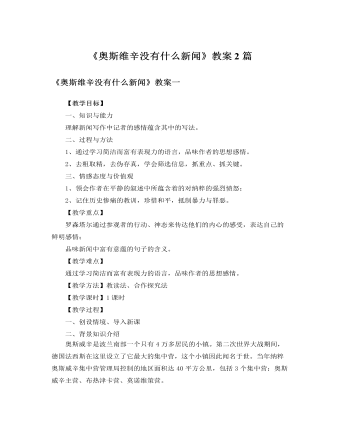
人教版高中语文必修1《奥斯维辛没有什么新闻》教案2篇
3.作者为什么不直接描写人们看见东西呢?请同学们找出其中的细节描写,并说明有什么表达效果。答:侧面烘托,正是作者高明之处,这也是许多佳作常用之法。细节描写往往会成为事情的切入点和突破口,一篇佳作往往离不开一些细节描写,本文也不例外,有些细节描写耐人寻味,如:“德国人撤退时炸毁的布热金卡毒气室和焚尸炉废墟上,雏菊花在怒放。”“这是一个二十多岁的姑娘,长得丰满,可爱,皮肤细白,金发碧眼。她在温和地微笑着,似乎是为着一个美好而又隐秘的梦想而微笑。”4.句子赏析:“对另外一些人来说,这样一个事实使他们终生难忘:在德国人撤退时炸毁的布热金卡毒气室和焚尸炉废墟上,雏菊花在怒放。”明确:一边是戕害生命的毒气室和焚尸炉,一边是生机勃勃的生命,两种反差极大的事物摆在一起。表达了作者对纳粹的讽刺:纳粹的残暴终归阻止不了生命的进程。同时也表达了作者的控诉:生命的绽放是人世间最美好的事情,对生命的戕害是最恶劣的罪行。
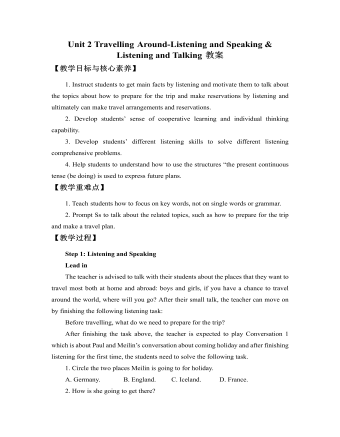
新人教版高中英语必修1Unit 2 Travelling Around-Listening and Speaking & Listening and Talking教案
【教学目标与核心素养】1. Instruct students to get main facts by listening and motivate them to talk about the topics about how to prepare for the trip and make reservations by listening and ultimately can make travel arrangements and reservations. 2. Develop students’ sense of cooperative learning and individual thinking capability. 3. Develop students’ different listening skills to solve different listening comprehensive problems.4. Help students to understand how to use the structures “the present continuous tense (be doing) is used to express future plans.【教学重难点】1. Teach students how to focus on key words, not on single words or grammar.2. Prompt Ss to talk about the related topics, such as how to prepare for the trip and make a travel plan.【教学过程】Step 1: Listening and SpeakingLead inThe teacher is advised to talk with their students about the places that they want to travel most both at home and abroad: boys and girls, if you have a chance to travel around the world, where will you go? After their small talk, the teacher can move on by finishing the following listening task:Before travelling, what do we need to prepare for the trip?
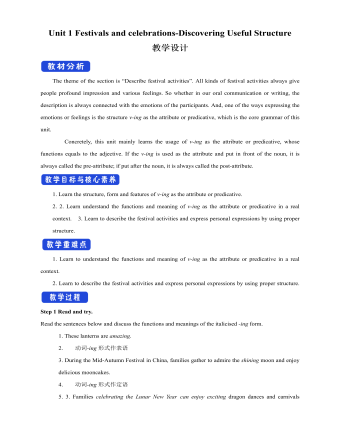
新人教版高中英语必修3Unit 1 Festivals and celebrations-Discovering Useful Structure教学设计
4.That was an experience that frightened everyone. →That was _____________________. 答案:1. taking 2. being discussed 3. in the reading room 4. a frightening experienceStep 6 The meaning and function of V-ing as the predicative动词-ing形式作表语,它通常位于系动词后面,用以说明主语“是什么”或“怎么样”一种表示主语的特质、特征和状态, 其作用相当于形容词; 另一种具体说明主语的内容, 即主语等同于表语, 两者可互换。The music they are playing sounds so exciting. 他们演奏的音乐听起来令人激动。The result is disappointing. 结果令人失望。Our job is playing all kinds of music. 我们的工作就是演奏各种音乐。Seeing is believing. 眼见为实。Step 7 Practice1. It is ________(amaze) that the boy is able to solve the problem so quickly.2. Buying a car is simply _______(waste) money. 3. Please stop making the noise—it’s getting ________(annoy). 4. complete the passage with the appropriate -ing form.La Tomatina is a festival that takes place in the Spanish town Bunol every August. I think many food festivals are __________ because people are just eating. however, this festival is _________ because people don't actually eat the tomatoes. Instead, they throw them at each other! the number of people ________ part in this tomato fight, can reach up to 20,000, and it is a very __________ fight that lasts for a whole hour. The _______ thing is how clean Bunol is after the tomatoes are washed away after the fight. this is because the juice form tomatoes is really good for making surfaces clean!答案:1. amazing 2. wasting 3. annoying4. boring interesting taking exciting amazing
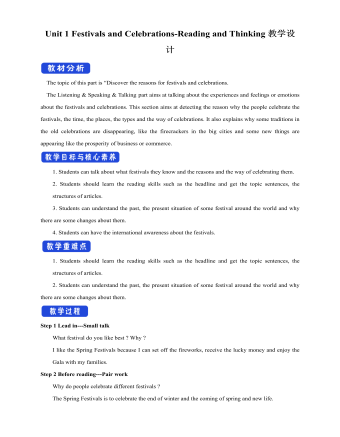
新人教版高中英语必修3Unit 1 Festivals and Celebrations-Reading and Thinking教学设计
The topic of this part is “Discover the reasons for festivals and celebrations.The Listening & Speaking & Talking part aims at talking about the experiences and feelings or emotions about the festivals and celebrations. This section aims at detecting the reason why the people celebrate the festivals, the time, the places, the types and the way of celebrations. It also explains why some traditions in the old celebrations are disappearing, like the firecrackers in the big cities and some new things are appearing like the prosperity of business or commerce. 1. Students can talk about what festivals they know and the reasons and the way of celebrating them.2. Students should learn the reading skills such as the headline and get the topic sentences, the structures of articles.3. Students can understand the past, the present situation of some festival around the world and why there are some changes about them. 4. Students can have the international awareness about the festivals.1. Students should learn the reading skills such as the headline and get the topic sentences, the structures of articles.2. Students can understand the past, the present situation of some festival around the world and why there are some changes about them.Step 1 Lead in---Small talkWhat festival do you like best ? Why ?I like the Spring Festivals because I can set off the fireworks, receive the lucky money and enjoy the Gala with my families.Step 2 Before reading---Pair workWhy do people celebrate different festivals ?The Spring Festivals is to celebrate the end of winter and the coming of spring and new life.The Mid-autumn Day is to celebrate the harvest and admire the moon.
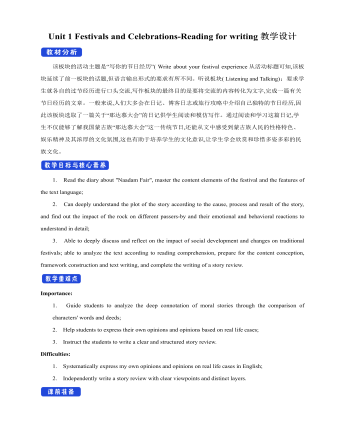
新人教版高中英语必修3Unit 1 Festivals and Celebrations-Reading for writing教学设计二
Step 3 Analyzing article structureActivity 31. Teachers raise questions to guide students to analyze the chapter structure of this diary and think about how to describe the festival experience. (1)What should be included in the opening/body/closing paragraph(s)?(2)How did the writer arrange his/her ideas?(3)What kind of interesting details did the writer describe?(4)How did the writer describe his/her feelings/emotions during the event?2. Students read and compare the three sentence patterns in activity 2. Try to rewrite the first paragraph of the diary with these three sentence patterns. After that, students exchange corrections with their partners. Such as:●This was my first time spending three days experiencing the Naadam Festival in China’s Inner Mongolia Autonomous Region and it was an enjoyable and exciting experience. ●I'll never forget my experience at the Naadam Festival because it was my first time to watch the exciting Mongolian games of horse racing, wrestling, and archery so closely. ●I'll always remember my first experience at the Naadam Festival in China’s Inner Mongolia Autonomous Region because it was so amazing to spend three days witnessing a grand Mongolian ceremony. Step 4 Accumulation of statementsActivity 41. Ask the students to read the diary again. Look for sentences that express feelings and emotions, especially those with the -ing form and the past participle. Such as:● …horse racing, wrestling, and archery, which are all so exciting to watch. ● some amazing performances● I was surprised to see…● I was a little worried about. . . ● feeling really tiredOther emotional statements:●I absolutely enjoyed the archery, too, but the horse races were my favourite part. ●I'm finally back home now, feeling really tired, but celebrating Naadam with my friend was totally worth it. ●He invited me back for the winter to stay in a traditional Mongolian tent and cat hot pot. I can’t wait!2. In addition to the use of the -ing form and the past participle, the teacher should guide the students in the appreciation of these statements, ask them to memorize them, and encourage them to use them reasonably in writing practice.
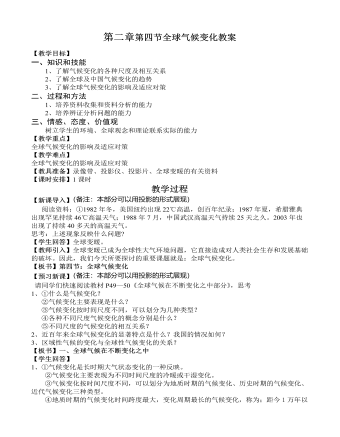
人教版高中地理必修1第二章第四节全球气候变化教案
气候变化对健康的影响 气候变化对人体健康的不良影响是不难发现的:热浪冲击频繁加重可致死亡率及某些疾病、特别是心脏呼吸系统疾病发病率增加;对气候变化敏感的传染性疾病如疟疾和登革热的传播范围可能增加。极端气候事件, 如干旱、水灾、暴风雨等, 使死亡率、伤残率及传染病疾病率上升, 并增加社会心理压力。某些媒介疾病的加重也可能与气候变化有间接的关系, 如疟疾是通过蚊子传播的疾病,气候变化可能使某些变暖地区的蚊子数目增加, 从而加重了疟疾的发生。我国1994年疟疾的发病率为5.3408/10万, 居全国法定传染病的第六位。血吸虫病的发展与高温及灌溉系统的扩增有关。我国1994年南方12省市血吸虫病患者的检出率高达3.67%,不能忽视气候变化对此的可能影响。还有一些疾病,如睡眠病、登革热、黑热病等也有与气候关系的报道。另外, CO2、一些空气污染物如氮氧化物、臭氧等可增加过敏疾患及心脏呼吸系统疾病和死亡。
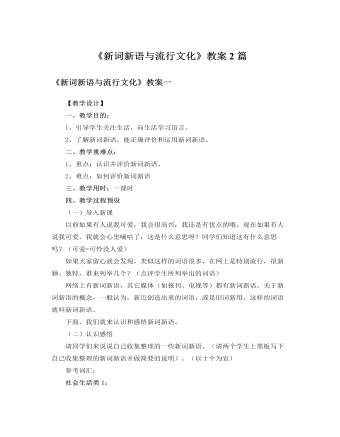
人教版高中语文必修1《新词新语与流行文化》教案2篇
【教学设计】一、教学目的:1、引导学生关注生活,向生活学习语言。2、了解新词新语,能正确评价和运用新词新语。二、教学重难点:1、重点:认识并评价新词新语。2、难点:如何评价新词新语三、教学用时:一课时四、教学过程预设(一)导入新课以前如果有人说我可爱,我会很高兴:我还是有优点的哦。现在如果有人说我可爱,我就会心里嘀咕了:这是什么意思呀?同学们知道这有什么意思吗?(可爱=可怜没人爱)如果大家留心就会发现,类似这样的词语很多,在网上是特别流行,很新颖、独特,谁来列举几个?(点评学生所列举出的词语)网络上有新词新语,其它媒体(如报刊、电视等)都有新词新语。关于新词新语的概念,一般认为,新近创造出来的词语,或是旧词新用,这样的词语就叫新词新语。
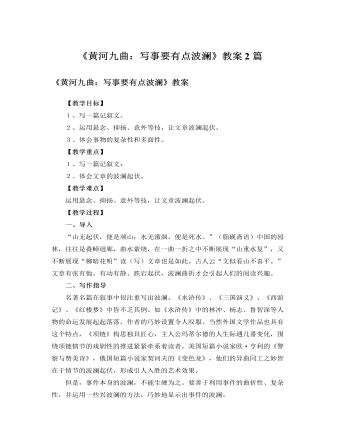
人教版高中语文必修1《黄河九曲:写事要有点波澜》教案2篇
1.悬念法悬念法又称关子。它是作者为了激发那种“紧张与期待的心理活动”,在行文中有意采取的一种积极而有效的手段。这种手段包括“设悬”和“解悬”两方面。所谓 “设悬”就是设置悬念,即在情节发生发展的关键时刻或人物命运攸关的重要关头,叙述戛然而止,转叙他事。从而引起读者强烈的寻根问底的兴趣。所谓“解悬” 也叫“释悬”,就是指在情节发展的特定阶段,通过矛盾的解决,揭示事情原委和人物命运的结局,使读者的期待心理得以满足。如《驿路梨花》,当人们正为露宿而发愁时出现了一间神秘的小屋,小屋的主人是谁呢?猜想间,有人来了,但也不是屋子主人,那小屋子的主人是谁呢?终于知道了小屋是解放军盖的,但为什么要盖这间小屋呢?这样“设悬——释悬——带出新悬念”,环环相扣、层层递进,使文章韵味无穷。
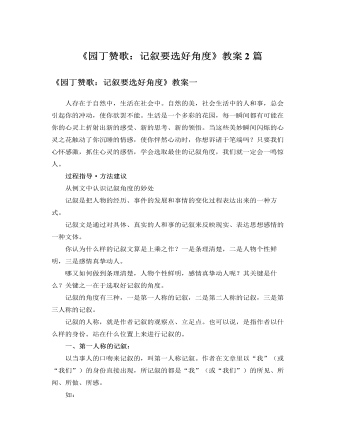
人教版高中语文必修1《园丁赞歌:记叙要选好角度》教案2篇
天上有明月,年年照相思。她夜夜沉醉在梦中。梦把空间缩短了,梦把时间凝固了,梦把世界净化了。梦中没有污秽,没有嘈杂,没有邪恶;梦中没有分离,没有创伤,没有痛苦;梦中只有柔和的月色,只有温馨的爱;梦使她永远年轻,使她不原醒来。…………啊,那个世界,是为天下最真最善最美的心灵准备的,艺术家怀着虔诚的情感,用充满魔力的琴弦,在人们的心中筑起了一座不朽的天堂,它像天地一样长久,日月一样永恒!新月微微地闭着眼睛,她清清楚楚地看到了那座天堂,真真切切地触到了那座天堂,冰凌砌成墙壁,白云铺成房顶,雾霭织成纱幔,星星串成明灯;在那里,她的头发像沐浴之后那样清爽柔软,随风飘拂,她的肌肤像披着月光那样清凉润滑,她的那颗心啊,像浸润着蒙蒙细雨的花蕾,挂着晶莹的露珠,自由地呼吸……她沉醉在那个一尘不染的美好的境界,如歌如诗,如梦如幻,如云如月,如水如烟……
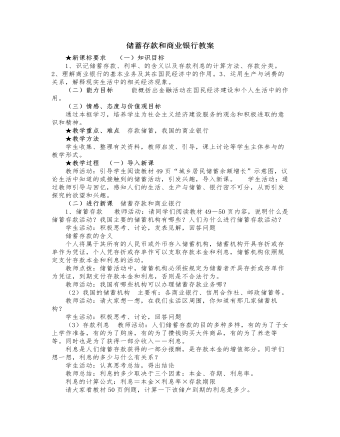
人教版高中政治必修1储蓄存款和商业银行教案
第三、结算业务结算业务时商业银行为社会经济活动中的货币收支提供手段与工具的服务。银行从中收取一定的服务费用。除上述三大业务外,商业银行还可以提供债券买卖与兑付、代理买卖外汇、代理保险、提供保管箱等其他服务。教师活动:商业银行在我国经济建设中具有巨大作用。请同学们看教材52页专家点评。学生活动:阅读课本,认真总结,得出结论(三)课堂总结、点评 这节课我们重点学习了储蓄存款和商业银行的有关知识,知道了储蓄存款活动程序、主要机构、特点和利息的计算等常识,了解了各种商业银行主要业务及其作用。这对于我们在日常生活中正确地办理金融储蓄业务将有重大指导作用。★课余作业 组织学生到附近银行、企业、居民中,咨询银行信贷活动的程序及原则要求,并亲自到商业银行办理一次存款和取款活动。





















